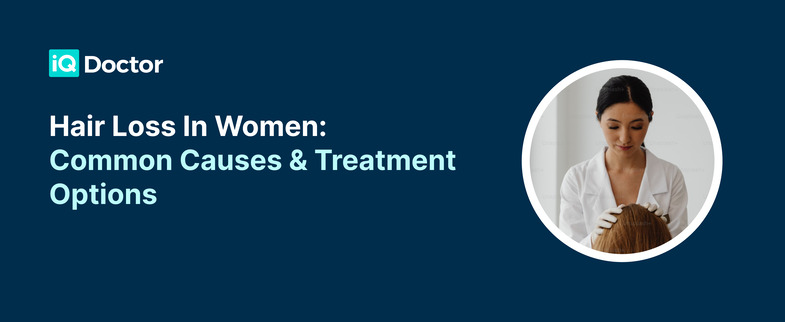Hair Loss in Women: Common Causes and Treatment Options
12 August, 2023 | Jane Thomas - Marketing

Hair loss is a common concern that affects both men and
women. While it's often associated with men, women also experience hair loss,
and it can be distressing and challenging to deal with. One of the most
prevalent forms of hair loss in women is androgenic alopecia, which is often
referred to as female pattern baldness. In this article, we'll delve into the
common causes of hair loss in women, with a focus on androgenic alopecia, and
explore various treatment options available, including the use of hair loss
tablets such as Propecia 1mg.
Understanding Androgenic Alopecia
Androgenic alopecia, also known as female pattern baldness,
is a genetic condition that affects women. It's characterized by the gradual
thinning of hair over the scalp's crown and frontal areas. Unlike male pattern
baldness, which often leads to complete bald spots, female pattern baldness
typically results in diffuse hair thinning. This condition is influenced by
hormones, specifically androgens, which are often referred to as "male
hormones."
Common Causes of Hair Loss in Women
Age: As women age, the rate of hair growth naturally slows
down, and hair follicles may become finer. This can result in overall thinning
of the hair.
Topical Treatments: Minoxidil is a commonly used
topical treatment for hair loss in women. It's available over-the-counter and
is applied directly to the scalp. Minoxidil promotes hair growth by increasing
blood flow to hair follicles and extending the growth phase of hair.
Hair
Loss Tablets: Propecia 1mg (Finasteride)
Propecia 1mg, containing the active ingredient finasteride,
is an oral medication primarily used to treat androgenic alopecia in men.
However, some women with androgenic alopecia may also benefit from its use.
Finasteride works by inhibiting the enzyme 5-alpha reductase, which converts
testosterone into dihydrotestosterone (DHT). DHT is a hormone that can shrink
hair follicles and lead to hair thinning.
Before considering the use of Propecia 1mg,
it's crucial to consult a healthcare professional, as this medication is not
typically prescribed to women of childbearing age or those who are pregnant, as
it can affect the development of male fetuses. Your doctor will evaluate your
medical history and provide guidance on whether this medication is suitable for
you.
Topical
Treatments: Minoxidil
Minoxidil is a topical solution that's available over-the-counter and can be applied directly to the scalp. It's a vasodilator, which means it widens blood vessels and increases blood flow to hair follicles. Minoxidil is thought to extend the anagen (growth) phase of the hair cycle, leading to increased hair thickness and growth.
For women, minoxidil is available in various strengths,
usually ranging from 2% to 5%. It's important to follow the instructions on the
product and apply it consistently to the scalp. Results may take several months
to become noticeable, and continuous use is often required to maintain the
benefits.
Nutritional
Supplements
Certain nutritional deficiencies can contribute to hair
loss, so addressing these deficiencies through supplements can support hair health
and growth. Biotin, a B-vitamin, is commonly associated with hair health and is
often included in hair growth supplements. Additionally, supplements containing
zinc, iron, vitamin D, and omega-3 fatty acids can provide the necessary
nutrients for optimal hair growth.
However, it's advisable to consult a healthcare professional
before starting any supplements, as excessive intake of certain nutrients can
have adverse effects on your health.
Low-Level
Laser Therapy (LLLT)
Low-level laser therapy (LLLT) is a non-invasive treatment
that uses red light to stimulate hair follicles. This stimulation encourages
cellular activity within the follicles, promoting hair growth. LLLT devices
come in various forms, including laser combs, helmets, and caps. These devices
can be used at home and should be applied to the scalp according to the
manufacturer's instructions.
While LLLT is generally considered safe, its effectiveness
can vary among individuals. Some users report improvements in hair density and
thickness, but results may take time to become visible.
Platelet-Rich
Plasma (PRP) Therapy
Platelet-rich plasma (PRP) therapy involves drawing a small
amount of the patient's blood, processing it to concentrate the platelets, and
then injecting the platelet-rich plasma into the scalp. Platelets contain
growth factors that can stimulate hair follicles, promote cell regeneration,
and encourage hair growth.
Lifestyle
Changes
In addition to medical treatments, making certain lifestyle
changes can contribute to overall hair health:
Stress
Management: Chronic
stress can contribute to hair loss. Practicing stress-reduction techniques such
as meditation, yoga, and deep breathing exercises can help.
Healthy
Diet: A
balanced diet rich in vitamins, minerals, and proteins is essential for hair
health. Incorporate foods like leafy greens, lean proteins, nuts, seeds, and
fruits to provide your body with the necessary nutrients.
Good Hair
Hygiene: Avoid
excessive heat styling and harsh treatments that can damage hair. Gently
cleanse and condition your hair, and use products that are suitable for your
hair type.
Regular
Exercise: Engaging
in regular physical activity improves blood circulation, which can benefit hair
follicles.
Conclusion
Reviewed By

Omar El-Gohary
The superintendent and lead pharmacist - registration number 2059792.
Omar is passionate about developing healthcare technology to empower our patients.


